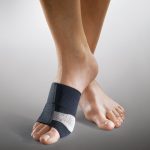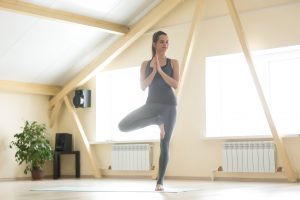 Have you known that nine out of ten students have an obvious curvature of the spine at the end of the college, every second person expresses his complaints about chronic back pain, every third is attributed to problems with sleep, every fifth has radiculitis? All these ailments have one common feature – they are united by the spine. What should you know about this important organ? The spine is the axis of our body, its support. It allows not only to keep our body in a vertical position but also has a spinal cord that allows you to control the entire body.
Have you known that nine out of ten students have an obvious curvature of the spine at the end of the college, every second person expresses his complaints about chronic back pain, every third is attributed to problems with sleep, every fifth has radiculitis? All these ailments have one common feature – they are united by the spine. What should you know about this important organ? The spine is the axis of our body, its support. It allows not only to keep our body in a vertical position but also has a spinal cord that allows you to control the entire body.
Various muscles and ligaments are attached to the spine, which keep the abdomen and back in the right position, and also help to strengthen all vital organs in their places, will not allow them to walk around the body. Almost all specialists tend to believe that most of the diseases and problems are associated with the spine arise because of the incorrect posture. The fact is, when the posture is wrong, then the load on the body is incorrectly distributed, which leads to a change in the position of all nerves, ligaments, and internal organs. Hence, there is the connection between the treatment of the spine itself and the internal organs of the body. There is, however, a reverse effect – painful processes occurring in some organs, painfully affect the muscles, which in turn are associated with certain parts of the spine. That is why when treating internal organs, you should not forget about the simultaneous strengthening of the spine.
Contents
- Pieces of Advice Before You Get Started
- Exercise 1: “Bridge”
- Exercise 2: “A dog and a bird”
- Exercise 3: Side plank
- Exercise 4: Lunges
- 4 Factors Leading to a Backache You Should Know About to Prevent It
- Video
5 Pieces of Advice Before You Get Started
 Before doing exercises, you should get acquainted with the rules. To avoid the unnecessary workload, do the following:
Before doing exercises, you should get acquainted with the rules. To avoid the unnecessary workload, do the following:
- During the first week, do exercises slowly, do not make any special effort.
- Begin with 2-3 repetitions of each exercise, gradually increasing to 10.
- Each time start with a small amplitude, gradually moving to the maximum.
- If you feel uncomfortable or tired, stop exercising for a while.
- Before each exercise, it is advisable to give yourself a little rest.
Exercise 1: “Bridge”
 Lay on our back and bend your legs. The feet should be pressed to the floor, at a distance equal to the width of your hips. Hands are relaxed.
Lay on our back and bend your legs. The feet should be pressed to the floor, at a distance equal to the width of your hips. Hands are relaxed.- Lie along the trunk. Strain the gluteus muscles and, lifting the pelvis off the floor, lift the hips upward.
- Carefully ensure that your body stretches into a perfectly straight line between the knees and shoulders.
- Fix the position for a few seconds and slowly sink back to the floor. The bridge is performed 12-13 times.
How helpful is this exercise? This exercise is a counterbalance to the sitting position (nowadays it is very important), which exerts too much pressure on the spine. You stretch the muscles of the thighs, stabilizing the spine (mostly in the lumbar region) and the muscles of the press and abdomen
How to complicate the exercise? Raise one leg and pull it up to the ceiling. The foot remains in the bent position, there is no need to “pull the socks”. Make sure that both hips are at the same level. This is much more difficult – try to hold on for so a few seconds, slowly drop to the floor and repeat the same 5-8 times with the second leg.
Important: By the way, the exercise helps to get rid of the hated protruding tummy.
Exercise 2: “A dog and a bird”
 Starting position reminds the pose of a dog. You should stand on all fours having knees on the width of the hips while hands with palms should be fully pressed to the floor on the width of the shoulders.
Starting position reminds the pose of a dog. You should stand on all fours having knees on the width of the hips while hands with palms should be fully pressed to the floor on the width of the shoulders.- Tighten the abdominal muscles and pull in the stomach so that the back does not bend and the hips do not move.
- Now get up in the pose of a “bird” – stretch the right leg back and the left arm forward. Hold on for 2-3 seconds, or more, if you are still able to stand motionless.
- Change your leg and arm. Repeat five or six times.
Why is this useful for your back? This exercise supports muscle tone and improves coordination, which strengthens the spine, makes the gait harder and stabilizes the back muscles in case you daily lead an active lifestyle and make your spine overextended without noticing it – dancing, walking, running, caring for a small active child.
Important: After some period of time, you should complicate the exercise. Gradually increase the “holding” time of the “bird” position to 10-12 seconds. Add a load, periodically slowly raising and lowering the leg and arm.
Exercise 3: Side plank
 Lay down on the right side, stretch the body in one straight line.
Lay down on the right side, stretch the body in one straight line.- Place your elbow on the floor. Make sure that the elbow is directly under your shoulder.
- Slightly tensing the abdominal muscles tear off the hips from the floor.
- The neck stretches in line with the spine. It is necessary to hold this position for 20-40 seconds. Then, turn around and repeat the same thing on the other side.
Why is this necessary? This exercise increases stamina, strengthens muscles and stabilizes the lower vertebrae, protects you from daily physical overloads (especially if you spend all day on your feet).
How to complicate the exercise? While holding the basic position described above, slowly lift up and lower the foot down to 5-6 scores.
Important: If you are particularly patient, you are recommended to keep your body not on your elbow, but resting on the floor with your palm. The arm is not bent at the elbow, the palm should be strictly under the shoulder.
Exercise 4: Lunges
 Slightly straining your abdominal muscles, step forward with your right foot.
Slightly straining your abdominal muscles, step forward with your right foot.- Place hands on hips. The step should be large enough.
- The leg bends at an angle of 90 degrees and the thigh parallel to the floor.
- Do the exercise 8-10 times.
- After being attacked by the right foot, return to the standing position and follow the same with the left foot.
Why is this useful? Lunges improve coordination, which is the key to a healthy spine state during walking, running, climbing stairs and prolonged standing on the legs. Also, the exercise stabilizes the muscles of the buttocks, which also cannot but rejoice.
How to complicate the exercise? Try right after the classic straight lunges to make them on the diagonal. What for? Such a change in the position of the foot will force you to do more to stay and not lose your balance. After several workouts with a complicated version, try to hold hands behind your head during lunges or pick up dumbbells to increase resistance. The main thing is to remember that without an elastic and strong muscular corset your spine is subjected to monstrous loads daily. This is not immediately noticeable, but at the mature age, ligaments, cartilage, intervertebral discs are seriously worn out. This creates an ugly hump in old age. Any “interruptions” in the work of the back pull for a whole bunch of diseases – from arthritis to poor vision. Beautiful back and healthy spine – this grace, a thin, delineated, tight silhouette and confident gait. So, let your back not have technical difficulties – it still tolerates you until old age!
Important: The daily 15-20 minutes of light exercise will save you from any painful surprises up to a very old age! Performing the above exercises will be enough to strengthen the back muscles and relieve the pain
4 Factors Leading to a Backache You Should Know About to Prevent It
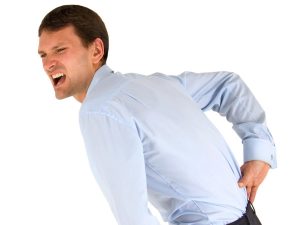 There is a good saying: “Forewarned is forearmed”. Those who care of their healthy back should learn more about the factors, which have a negative influence on the spine. If you know what may cause the backache, you can prevent it. Learn more about factors, which have a negative impact on your back and do your best to avoid the mentioned causes. The most common cause of chronic pain in the back area is that the spine or its site undergoes excessive compression, resulting in vertebrae squeezing downward, approaching each other. The intervertebral discs lose their elasticity and contract, the small articular surfaces close too tightly, and the edges of the vertebrae either wear off or they form bone growths, called osteophytes. Dysfunction of the muscles is the most common cause of compression of the spine and can itself be the result of a sedentary lifestyle, incorrect posture, muscle imbalance and weakness of the abdominal muscles.
There is a good saying: “Forewarned is forearmed”. Those who care of their healthy back should learn more about the factors, which have a negative influence on the spine. If you know what may cause the backache, you can prevent it. Learn more about factors, which have a negative impact on your back and do your best to avoid the mentioned causes. The most common cause of chronic pain in the back area is that the spine or its site undergoes excessive compression, resulting in vertebrae squeezing downward, approaching each other. The intervertebral discs lose their elasticity and contract, the small articular surfaces close too tightly, and the edges of the vertebrae either wear off or they form bone growths, called osteophytes. Dysfunction of the muscles is the most common cause of compression of the spine and can itself be the result of a sedentary lifestyle, incorrect posture, muscle imbalance and weakness of the abdominal muscles.
Sedentary lifestyle
Sedentary lifestyle contributes to the occurrence of chronic pain in the back area. If you do not give the muscles a regular load, they lose the ability to completely contract and become weak. This means that they can no longer provide sufficient tension and perform their task, creating a support with the other tissues for the spine and holding it in the correct position. Regular light exercise is enough to keep the muscles in good shape.
Wrong posture
Any posture at which the natural curvatures of the spine are distorted causes changes in the muscles that eventually become permanent. When distorting the natural bends of the spine, the intervertebral discs contract and eventually become thin and lose elasticity. The muscles change, because they work in pairs: if one muscle group is contracted, the other, the opposite one, relaxes. For example, if you stoop for a long time, the pectoral muscles contract and remain in this state, and the muscles of the upper back relax. Over time, the muscles of the chest become stronger, and the muscles of the upper back weaken. Your back becomes round, and the pressure on the spine is uneven, and as a result, chronic back pain occurs.
You should know 4 main rules of good posture:
- It is necessary to fall asleep on a hard bed, good, if it is a floor.
- Special footwear, which not only eliminates the problem of unequal legs, but also a rather urgent problem of flatfoot and clubfoot, which also adversely affect the spine.
- It is necessary to be constantly in motion, to be active, to engage in physical training, to walk.
- Watch the position of your body and, as it were, you want to give up such habits as wrong sitting (leg by foot) or standing on one leg. The load on the spine should be distributed evenly. In addition, you need to be able to properly distribute the gravity, do not carry heavy things in one hand.
Muscular imbalance
The ability to equally well hold the right and left hand (double-directional, or ambidextrous) is rare, so you are unlikely to use both hands equally. As a result, the muscles on one side of the body become more developed than on another one. In some cases, for example in passionate tennis players or squash, because of the extra effort created by the more developed side of the body, the vertebrae system is broken to such an extent that when viewed from the back, a line in the shape of the letter “S” or “C” can be noticed. This is an extreme example, but even a slight difference in the development of the parties affects the state of the thoracic spine. It may look straight, but the pressure on the vertebrae and intervertebral discs will be uneven. Over time, the discs on the more developed side will gradually flatten, the vertebrae will wear out and the small articular surfaces will close.
Weakness of abdominal muscles
Powerful abdominal muscles serve as a corset that keeps the abdominal organs close to the spine. In a normal state, this corset takes over some of the body weight, unloading the spine and hips. However, any weakening of the musculature of the abdomen, which may be the result of a fixed lifestyle, excessive body weight, pregnancy, leads to an increase in the load on the lumbar spine. The result may be an excessive deflection of this part of the spine forward, called lordosis, which, ultimately, will cause chronic back pain.
The muscles of the abdomen and back should be not only flexible, but also strong, in order to properly support the spine. Weak muscles are unable to take on their share of the stresses and stresses that the back should resist, which means that they have to work joints and ligaments that are not as well supplied with blood as muscles. Over time, the joints and ligaments wear out more and more, which leads to tissue damage and chronic back pain. Exercises are aimed at strengthening the muscles, help to get rid of the pain, increasing the ability of the muscles to take stress and thereby facilitating the work of ligaments and joints.
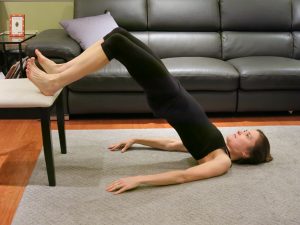 Lay on our back and bend your legs. The feet should be pressed to the floor, at a distance equal to the width of your hips. Hands are relaxed.
Lay on our back and bend your legs. The feet should be pressed to the floor, at a distance equal to the width of your hips. Hands are relaxed.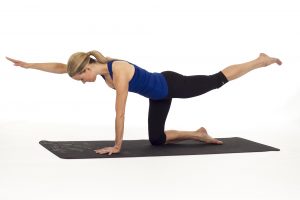 Starting position reminds the pose of a dog. You should stand on all fours having knees on the width of the hips while hands with palms should be fully pressed to the floor on the width of the shoulders.
Starting position reminds the pose of a dog. You should stand on all fours having knees on the width of the hips while hands with palms should be fully pressed to the floor on the width of the shoulders.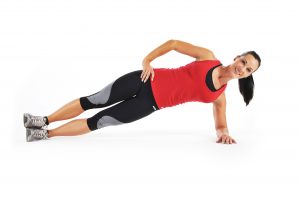 Lay down on the right side, stretch the body in one straight line.
Lay down on the right side, stretch the body in one straight line.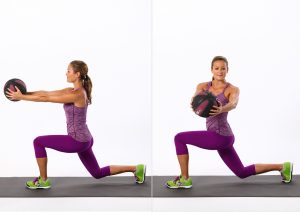 Slightly straining your abdominal muscles, step forward with your right foot.
Slightly straining your abdominal muscles, step forward with your right foot.




